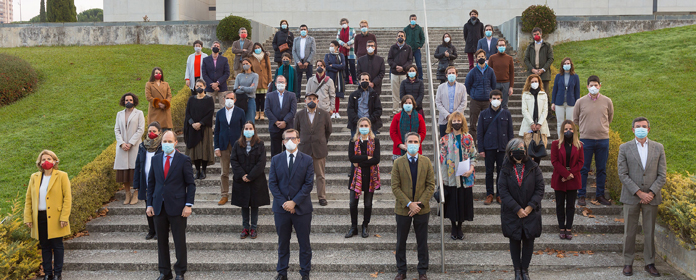X annualmeeting of the Institute for Culture and Society reflects on the impact of research on society
ICS researchers have reflected on the social resonance of their research at an event held as part of the X the center X

PHOTO: Manuel Castells
The X annualmeeting of the Institute for Culture and Society (ICS) of the University of Navarra focused on the'Social impact of ICS research '. During the workshop, researchers from the center reflected on how their work contributes in a unique and fundamental way to the impact on society. In addition, they drew up a draft map of the center's social impact, which, according to its authors, reflects the multitude of areas of resonance of its research and sample the value of its wealth of approaches and interests.
Examples of ongoing research have been presented that make tangible the contribution of research to the educational, governmental, business, cultural and staff spheres. Among them, projects that seek to integrate the multiculturalism of today's societies in school classrooms and in society or that seek to offer tools for human development in adolescents and young people. Also highlighted is the advisory potential of research for companies, professionals, associations and governments, such as the study of language for large technology companies, its application for the training of health professionals or the recovery of heritage to make it available to society.
Finally, there has been a roundtable with the participation of four principal investigators of projects: José Ignacio Murillo, from'Mente-cerebro'; Montserrat Herrero, from 'Religion and Civil Society Luis Ravina, from the Navarra Center for International Development; and Alfonso Osorio, from 'Education of affectivity and human sexuality'.
The research as source of hope and truth.According to Fran Güell, coordinator of meeting and researcher of group 'Mind-brain', there are multiple ways of understanding social impact, as well as of doing research. He has considered it fundamental to ask why, for what and for whom is social impact relevant in research.
Given that the ICS is made up of researchers and groups with very different interests and methodologies, Güell considered it difficult to synthesize the areas and groups where the ICS's research can find resonance. On the one hand, he highlighted specific groups, such as the educational community and health systems, where the production of the practical knowledge of the ICS "comfortably" finds its place. On the other hand, he indicated that "we find important research whose theoretical production, not being directed or motivated by any social group, aspires to support future developments of research with social interest".
For Güell, both society in general and academic community and education can be enriched by research. He considered that today's society needs hope and truth, elements that require a wave of reflection and analysis of reality. He pointed out that, in order to extract all that reality has to offer, it is necessary to look at it with cleanliness -without biases- and with humility. He pointed out that, in the scientific research , it is essential to disseminate what has been achieved "in the hope of receiving fair criticism from experts from other places that will allow us to rectify and improve our proposals". "We should not be obsessed with social impact; scientific production should find a resonance in society and its applications should transform it for the better", he concluded.
Ten years of research with impactThe X annualmeeting is part of the celebration of the X of the ICS. Jaime García del Barrio, director of the ICS, highlighted some of the milestones of the ICS at the opening of the event. In these ten years, 844 articles have been published (78% in publications considered Q1 and Q2), 183 books and 428 book chapters; 23 doctoral thesis have been defended; and 81 congresses and workshops have been organized. Since 2010, 180 people of 28 nationalities have worked at the ICS.
In addition, the company has received several competitive public grants at international, national and local level. The European Commission has granted aid under the VII Program framework and Horizon 2020, including several Marie Curie actions. Moreover, the ICS has received funding from the Spanish Government, through different ministries, for research projects, as well as grants for postdoctoral recruitment (Ramón y Cajal and Juan de la Cierva) and for the mobility of its researchers (Senior and José Castillejo). The Government of Navarra has also granted competitive funds to develop research projects. Likewise, other institutions and foundations, such as Ramón Areces, 3ie, Obra Social "La Caixa", FUNCIVA, Santander, Zurich, Fundación CAN, Templeton World Charity Foundation and John Templeton Foundation, among others, have supported the center's research .
